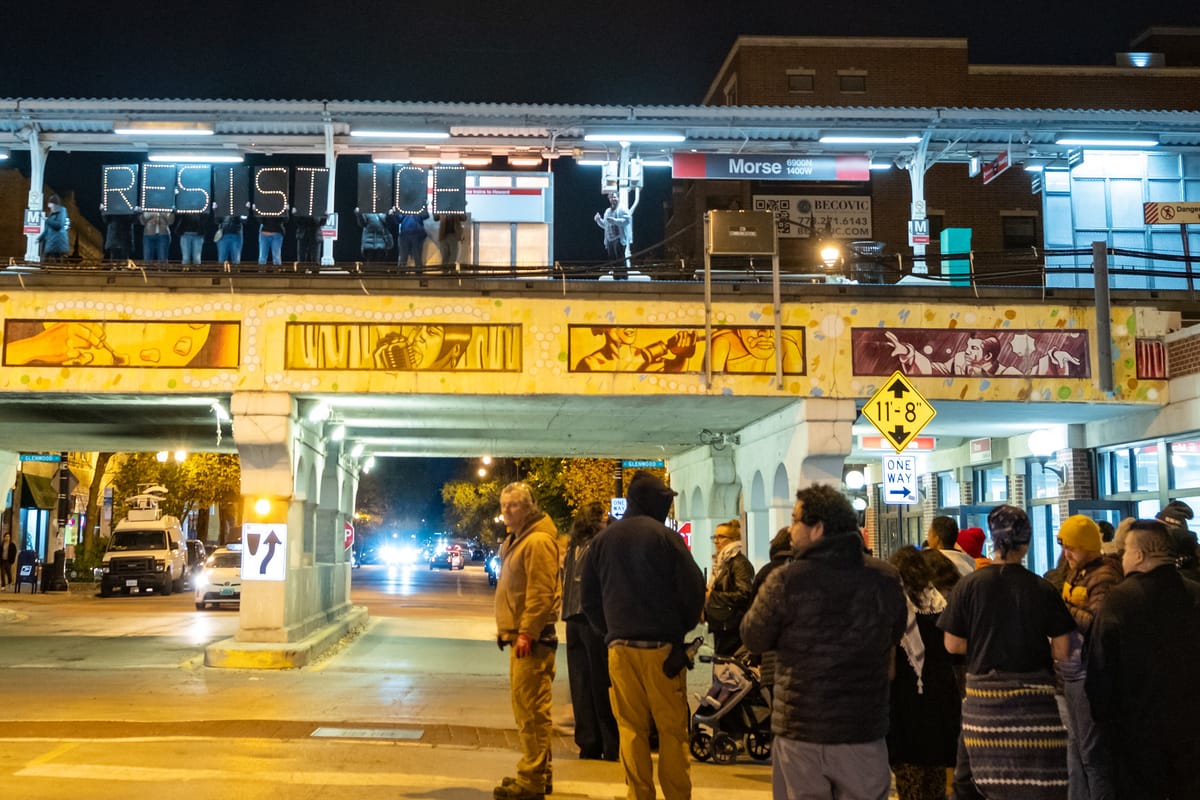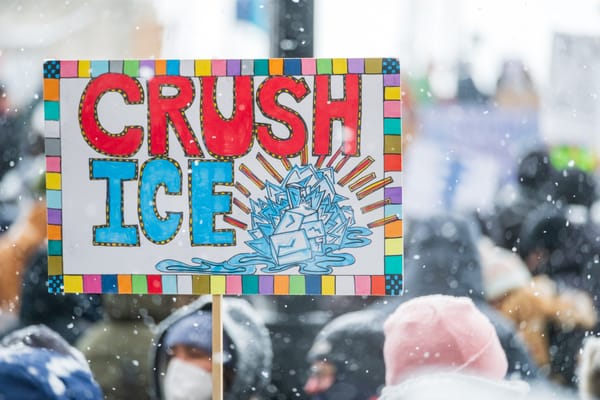In Chicago, We Run Toward Danger Together
"Faced with unrelenting state violence, Chicagoans have refused to be cowed," says Mariame Kaba.


This week, a jury in Washington D.C. refused to convict a man who became a folk hero when he threw a sandwich at a federal agent. In New York City, Zohran Mamdani won a brilliantly executed mayoral race against sexual harasser and primary loser Andrew Cuomo. In Chicago, a federal judge called out Border Patrol chief Gregory Bovino for lying during a deposition, and again ordered ICE agents to limit their use of force in the Chicagoland area. It’s important to celebrate victories—to raise a glass, to exhale in relief, to crack a smile, or even laugh out loud, because finally, something has gone right. But these days, wins and losses unfold rapidly, and pivoting from one feeling to the next can be a challenge. When you’re living in a state of emergency—hypervigilant and raging against injustice—feelings of bitterness, rage, grief, and anxiety can feel all-consuming.
More than 3,000 people have been abducted by ICE across Chicagoland since early September. For those of us responding to that crisis, it can be hard to respond to anything else.
For me, the most heartening thing about this moment is the collective courage on display in my city. As journalist Sarah Lazare recently wrote on social media, “[I] don’t want to downplay the harm [or] make it seem like a fair fight. But in neighborhoods across the city, ICE is getting chased by people blowing whistles and shouting. People are running TOWARD ICE to protect neighbors.” So many Chicagoans are not only practicing vigilance, but rushing toward ICE agents, thrusting themselves into dangerous situations—sometimes, in organized deployments, and sometimes, in their pajamas, as they run out of their homes because whistles are being blown.
Sometimes, these efforts pay off. There are moments when we are able to deter or interrupt federal agents, or successfully alert our targeted neighbors, allowing them to evade ICE. But far too often, we arrive in the wake of an abduction, and are left trying to piece together what happened, or find ourselves witnessing something awful, wholly unable to intercede. Those moments of witnessing may be the worst—when ICE agents, who are usually gone before we arrive, are still present, with our captured neighbors in their grasp, and we’re unable to do a goddamn thing about it, except document the harm being done. (Documenting such moments is profoundly important, and also excruciating.)
Earlier this week, after one of those moments, I felt like a hole had opened up inside my chest, and it was swallowing up everything I might think or know how to do. I could barely speak. My partner asked what we should do next. I couldn’t answer. I was sputtering inside and had nothing to offer.
I felt terrible about that sudden fit of ineptitude. After all, I wasn’t one of the men who’d been thrown in the back of a van. I wasn’t the young woman asking one of my friends what she should do now, because one of those men was her father. I was just a person, wounded by the inhumanity of other people. In that moment, I probably couldn’t have told you my birthday or phone number if you had asked. I was reeling, devastated, and so frustrated with myself.
With a little distance, I can see how unreasonable I was being. If I had fallen and scraped my knee during that incident with ICE, I wouldn’t have thought twice about taking the time to clean and bandage my wound, once the situation was over. I wouldn’t have questioned how I could bother with my bloody knee, when such terrible things were happening. I simply would have recognized the need to tend to my injury, and done so.
Fortunately, others recognized that need. Someone urged me to slow down and take care of myself. Someone held my hand. A friend sang with me, and reminded me what matters. So, here is my attempt to pay it forward.
A lot of people are looking to Chicago right now, because the work we’re doing—the work you’re doing, if you’re wearing a whistle, protesting in the streets, practicing mutual aid, or responding to ICE alerts—is helping people around the U.S. imagine a meaningful response to the threats they face. People who feel frozen or stuck, or who have no idea how they would respond to such an onslaught, are getting a sense of what they’re made of.
In some cases, people who can’t move as freely or as loudly as they would like to feel defended and cared for. My friend William*, an undocumented organizer in New York, has been forced to keep a lower profile in recent months to avoid being kidnapped and deported. While grappling with those limitations, William told me he has been heartened by our actions in Chicago. While Democratic elites have sunk beneath his low expectations, Chicagoans have offered William hope. “In the midst of an immigrant pogrom, the Democratic Party is still largely divided over whether it should respond forcefully to all this brutality,” he told me. “But what we are seeing in Chicago—and thankfully in other parts of the country—is that regular people have stepped up to confront these ICE raids, family separations, and kidnappings. Many community members have been putting their bodies and safety on the line to protect their immigrant kin,” he said. “We see this every day in Chicago, which is currently giving the nation a stellar example of how to fight back against these xenophobic pogroms.”
Silky Shah, executive director of Detention Watch Network, praised the long-term organizing that helped Chicagoans prepare for this moment. “For years, the people of Chicago and surrounding communities have fought to limit ICE’s reach,” Silky told me. “Despite the federal government’s repeated efforts to increase deportations and expand detention in the region, Chicago organizers have adapted their strategies to throw a wrench in ICE’s plans, playing one of the most successful games of whack-a-mole against detention while advocating for everyone—including immigrants encountering the criminal legal system.” While the scope and scale of ICE’s tactics have changed, Silky noted that Chicagoans have not wavered in their resolve. “In a time when the levers of power are so limited, the steadfast organizing in Chicago remains a beacon of hope and essential guide for activists across the country.”
My friend Mariame Kaba, who organized in Chicago for many years before returning to New York City, also praised Chicago’s organizing as an example for other cities. “The regime wants all of us afraid,” Mariame told me. “It is counting on fear immobilizing us and perhaps even turning us against each other. Instead, what we are currently seeing in Chicago is that solidarity can overcome fear and can give people the courage and tenacity to fight for each other.” Mariame emphasized that Chicagoans are helping to light a path forward in this moment. “Faced with unrelenting state violence, Chicagoans have refused to be cowed. They’ve embraced the unknown as an opportunity to actually shape the future they dream.”
I am honored to be part of that refusal, and to think and dream alongside people like my friend Olly Costello, an artist and activist I have worked with many times over the years, and who I am steadily encountering in the streets as our rapid response work plays out. Olly is no stranger to the painful feelings I’ve described—the sense of defeat that can creep in when our best efforts cannot prevent a dreaded outcome. “There are days when getting out on my bike with my little plastic whistle and safety vest feels futile,” they told me. “What strength do I have to match their vehicles, their weapons, their impunity,” they asked.
Then, Olly reminded me of my own words: “What we have is each other and our will to remake the world.”
“Having each other is no small feat,” Olly said.
They also spoke about the strength they feel well up inside of them in moments of crisis and precarity. “When the raids hit, and I see my community out en masse, I feel myself transformed by the bravery, innovation and determination of my neighbors to keep each other safe and defend our shared belonging.” Olly reminded me of the creativity and ingenuity we have brought to this fight. “We are building new infrastructure, creating warning systems to reduce abductions, sharing resources to support families with missing loved ones, and turning toward each other in ways I have not yet experienced,” they said. “I have never felt so connected to this neighborhood, where I have lived for half of my life. When I am out bike patrolling, seeing so many neighbors out doing the same, I can feel, for the first time, maybe we are all on the same team.”
Gabe Gonzalez, an organizer with Protect Rogers Park, hopes that people around the country recognize that if this kind of infrastructure doesn’t exist yet in their communities, it can be built. “I think the most important lesson from Chicago right now is that anyone can do this and everyone should do this,” Gabe told me. “The distributed nature of the movement is key. At Protect RP we always remind people that everyone can do something, and that something will matter.”
Something will matter. Please, hang onto those words, whatever your something might be, because it all matters. As Mariame told me, “I am filled with gratitude for everyone fighting against ICE and this regime in all the ways that they can: blowing whistles, patrolling alleys, buying out vendor carts, filming ICE, protesting detention centers, engaging in mutual aid, documenting the violence, walking other people’s children to and from school and so much more. While this is a challenging time, Chicagoans are facing it with profound courage and sustained action. I am buoyed by the resistance and love being shown by neighbors to other neighbors and by strangers to strangers.”
I keep using the word “ecosystem” to describe the emerging and enduring resistance in our city, because I don’t think there’s a better way to describe it. We are talking about life—the ways we depend on one other and sustain each other as we make and unmake each other. Even when we fail, and our spirits collapse, we are living in opposition to that which would destroy us. We are living and fighting for each other, and that means we have a chance.
So, if you're hurting, struggling, or sputtering inside right now, I want you to take a moment to see what I see.
I see you, Chicago. I see you brave and beautiful in your cars, tailing ICE vehicles. I see you charging out of your homes before you’ve brushed your teeth to blow your whistles, shout down ICE agents, and hold onto your neighbors. I see you getting arrested and facing charges. I see you defending each other in the face of repression. I see you singing in the street, on a chilly Monday night, holding a lighted message that reads “RESIST ICE.” I see you gathering, hundreds at a time, to learn, to keep watch, and bare your teeth. I see you running toward danger, together, and loving each other more fiercely than you ever knew you could.
I thought I knew what it meant to love Chicago—to feel something settle inside of me when I saw her skyline from the expressway, or her lights from the window of an airplane, after crossing the cloud line. I thought I knew what it meant to love her brick and steel towers, her annoying street preachers, her chorus of accents and the poetry of her activists, the grit of her workers, awaiting buses and trains in icy air, her guerrilla gardens, bookshops, bucket boys, and crashing winter waves becoming shelves of ice—so many corners that feel like home, even though you’ll never live there. I know this place. I love this place, and I thought I knew how much, until you made me love it more.
When you check your alerts, when you rush to the corner knowing you probably won’t get there in time, when you film the abduction you couldn’t prevent, or hold onto someone the fascists would rip away—or get ripped away yourself, because you tried—you are reminding us what we owe to each other, and what it means to fight fascism.
I know it's hard. I see you stumbling through the stubborn, awkward rhythm of showing up, again and again. I see you fighting alongside people who sometimes frustrate and confuse you, and defending neighbors you may have never met, because you know they’re all your people.
Chicago, I see you. I know you. I love you. And I believe we can build a new life in this moment—something we can keep, that will also keep us.
As my friend Olly said, “I am so grateful for us all, and when this violence is over, I hope our togetherness never ends.”
*William’s name has been changed to protect his identity and safety.
Organizing My Thoughts is a reader-supported newsletter. If you appreciate my work, please consider becoming a free or paid subscriber today. There are no paywalls for the essays, reports, interviews, and excerpts published here. However, I could not do this work without the support of readers like you, so if you are able to contribute financially, I would greatly appreciate your help.




